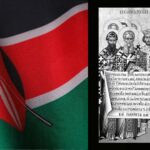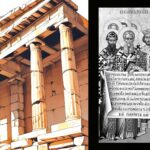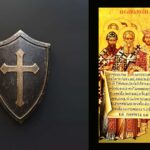At the heart of many major heretical teachings is the question: ‘Who is Christ?’ By allowing a distorted version of who Christ is, we run the risk of distorting our understanding of how we, sinful people, can be reconciled to the absolutely holy God. Distorting the identity and divinity of Christ is nothing new. Church history attests to this fact, and the Church’s zealous defence of who Christ is signals the importance of getting it right. One such case was the controversy of the 4th century, concerning Arianism.
Many modern false teaching movements are little more than reprisals of ancient heresies.
But these debates aren’t simply for the history books or lecture halls. Many modern false teaching movements are little more than reprisals of ancient heresies. As we’ll see below, this is especially true of Arianism and Jehovah’s Witnesses. By making this case I hope to demonstrate more than this well-established link, convincing you that an awareness of heresies guards against destructive theology.
Who did the early Christians think that Christ was? Did they believe he was God? The first 300 years of Christianity were not without its share of controversies regarding the nature of Jesus Christ. Key to this article is the conflict that ensued between an Alexandrian teacher, Arius (256-336 CE), and the Bishop of Alexandria, Alexander (250-326 CE).
The Son of God, According to Arianism
Arius and Alexander agreed that Jesus was the Son of God. Moreover, they agreed that he was God, who created the universe. Their controversy arose from what they thought about God the Son in relation to God the Father. The question might be put like this: ‘In what sense was Christ God?’ For Arius, Jesus Christ was a created being. Though he was the firstborn of creation, Christ was not eternal.
Arius taught that the Father’s divinity was greater than the Son’s.
Working from Colossians 1:15, Arius held that God the Son was the Father’s first creation; and that through the Son the Father created everything else. Sure, this afforded the Son a unique position among God’s creation. But he was nevertheless created and therefore not eternal. Thus Arius taught that the Father’s divinity was greater than the Son’s. He wrote: “If the Father begat the Son, he that was begotten had a beginning of existence: and from this, it is evident, that there was a time when the Son was not.”
The Church’s Response at Nicaea
Alexander refuted Arius’ position, arguing that Christ was begotten, not made. With this, the Son was and is fully equal to the Father. To understand the term ‘begotten’ we must first appreciate that it has its origin in the Greek word monogenes. This word is typically translated as ‘only begotten,’ ‘one-of-a-kind,’ and ‘unique.’ The word describes a child’s unique relationship with their parent. So the emphasis was always on the relationship and not physical begetting.
The Son was and is fully equal to the Father.
In 325 CE, the Roman Emperor Constantine convened the Council of Nicaea to resolve this conflict. For it was causing considerable disunity in the empire. The council was constituted of two key leaders: Alexander of Alexandria, accompanied by Athanasius; and Arius. Although Athanasius did not write the Nicene Creed, he actively participated in championing its theology against the heretics who taught Arianism at the Council of Nicaea. More than 300 bishops were in attendance.
The debate raged. But the eventual result was a preliminary version of the Nicene Creed. This creed affirms both the divinity and eternality of Christ, that the Son was of the same substance as the Father. Arianism was condemned.
Why Was This Such a Big Issue?
If Jesus Christ is not God, salvation is impossible.
Arianism touched the core of Christianity: Christ himself. The foundational question is this: ‘How can one who is a mere creature save sinners?’ How can a creature redeem other creatures from the wrath of an infinitely holy God? Athanasius asked: “What help can creatures derive from a creature that itself needs salvation?”
If Jesus Christ is not God, salvation is impossible.
The creation of God was corrupted by sin at the fall. Thus no creature of God is able to be the perfect sacrifice for our sin. A key verse in this matter is 2 Corinthians 5:21. “For our sake he made him be sin who knew no sin so that in him we might become the righteousness of God.” If Jesus Christ our Saviour is not God incarnate, there is no salvation.
Arianism Today: Jehovah’s Witnesses
Though having been thoroughly condemned, the Arian heresy continues today. Founded in the late 19th century by Charles Taze Russell, the Jehovah’s Witnesses teach that Jesus is a created being who is not eternal and is not God. They also teach that Jesus Christ was Michael the Archangel. But the Bible clearly teaches that Jesus is God (Hebrews 1:8; John 1:1, 14; 20:26-18; Acts 20:28; Romans 9:5; 2 Peter 1:1).
Jehovah’s Witnesses teach that Jesus is a created being.
To support their false doctrine, Jehovah’s Witnesses insist on their New World Translation (NWT), which contains both omissions and additions to the Bible. For example, it renders John 1:1 as “the word was a god.” Their unjustified addition of the indefinite article (“a”), radically changes the meaning of the text, making the Son a subordinate, lesser god.
Another example can be found in Colossians 1:15–17. The NWT renders those verses: “For by means of him all other things were created.” But the word “other” is not present in the original Greek; it’s been added to justify the Arian teaching of the Jehovah’s Witnesses. Like Arius, they claim that Jesus was the first thing created by Jehovah, before all other things were created through him.
Unwarranted changes to the words of scripture aren’t only deceptive. They will lead followers to destruction. As one apostle put it, “False prophets also arose among the people, just as there will be false teachers among you, who will secretly bring in destructive heresies, even denying the Master who bought them, bringing upon themselves swift destruction” (2 Peter 2:1).
Christology Is Crucial
For us to understand Christianity in its essence, the person and work of Christ is vital. It’s crucial. Indispensable. Heretical teachings that reject the divinity and humanity of Christ also reject his finished work on the cross. They make salvation impossible. We must be wary of false teaching whenever it comes. As Paul exhorts in 1 Thessalonians 5:21-22, “Test everything, hold fast to what is good and abstain from every form of evil.”














